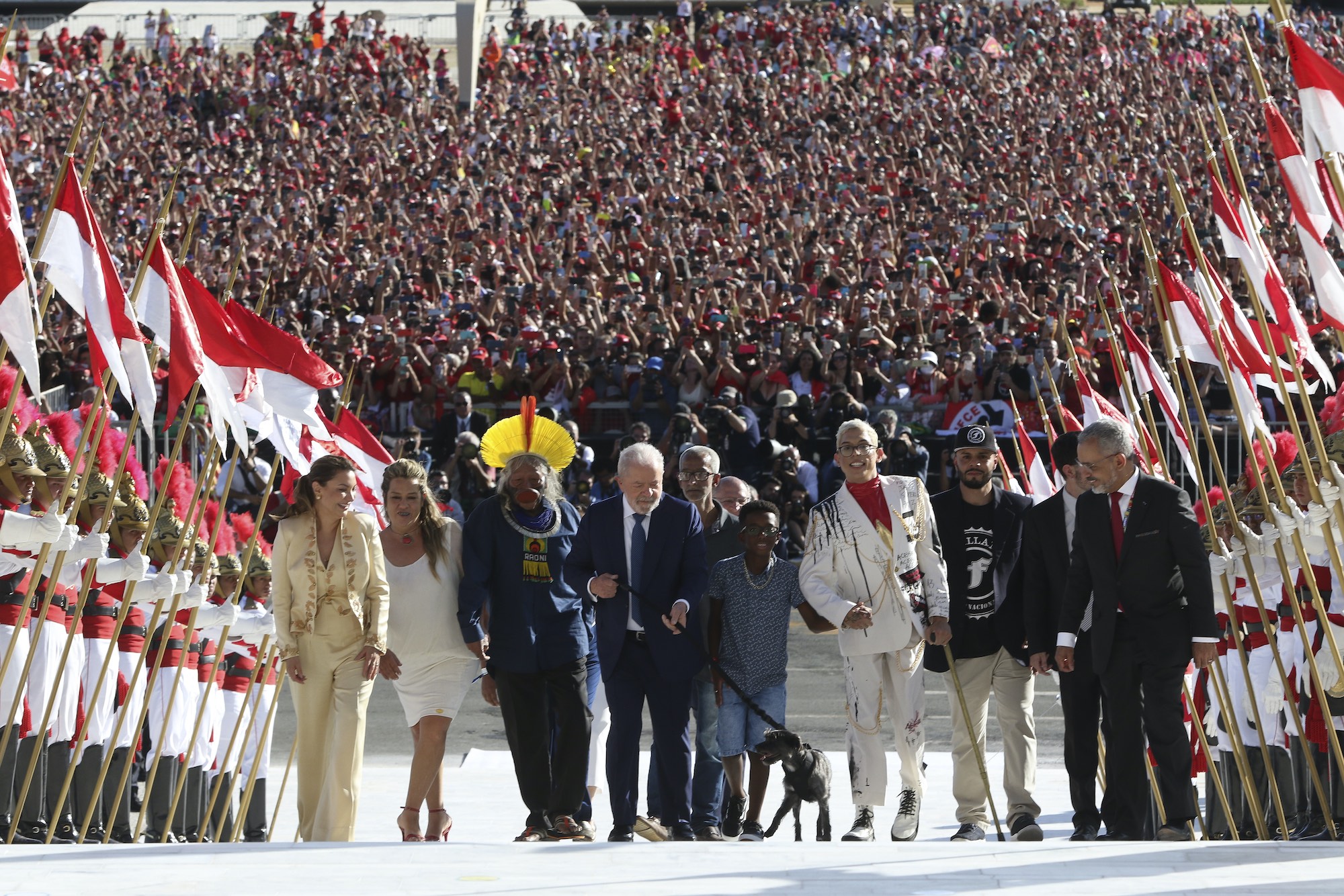Lula is back: the task ahead
President Lula returns to office with an ambitious agenda to tackle inequality and deforestation across Brazil. João Arthur Reis (MPP 2021) examines his re-election and the obstacles his government faces in delivering.

On 1 January 2023, Luiz Inácio Lula da Silva was inaugurated as President of the Republic of Brazil. In his first presidential speech he set out his governmental priorities: tackling extreme poverty and inequality in all forms, curbing deforestation and getting the economy back on track. Importantly, he vowed to put an end to the years of radicalisation and political violence that peaked during the 2022 elections by stating that ‘[t]here’s no such thing as two Brazils’.
Lula was elected for his third term 20 years after his first election. Twelve years after the end of his mandate, the resilience of his popularity is remarkable. By the end of his second term in 2010 his approval rating had reached 80 per cent, but his popularity plummeted after a series of corruption scandals revealed by the controversial Lava Jato Operation hit Lula’s leadership and culminated with his imprisonment in April 2018. Serious processual flaws and revelations of collusion between the judge and the prosecution led his condemnation to be ruled illegal, and then annulled in 2021.
Released from prison, Lula’s popularity levels were higher than any other potential candidate in the 2022 general election. The main reason for this was the memory of his government’s combination of economic growth with redistribution through real increases in the minimum wage and the creation of social programmes such as the famous Bolsa Família. This legacy endured even with the economic crisis initiated during Dilma’s abbreviated and crisis-torn government.
Polls that indicated a landslide victory for Lula in the general election led several centre and centre-right politicians to gather around his name. His opponent Bolsonaro’s disastrous handling of the pandemic, meagre economic management and open disregard for democracy led most democratic forces to align with Lula. Even notable past adversaries established alliances with Lula early in 2022; the vice president, Geraldo Alckmin, ran against Lula in 2006 and was for many years the centre-right opposition leader, and Marina Silva, the current Minister of Environment, left Lula’s Government in 2008 to create her own party and ran for President in every election since, until deciding to support him in 2022.
Despite this wide and unlikely coalition, victory was not assured. Bolsonaro’s approval ratings had been stable at around 30 per cent during most of his time in government and were an important asset for him during the elections. His popularity lay in the combination of his anti-corruption and anti-crime rhetoric with a strong religious component. Bolsonaro’s electoral victory in 2018, deemed unlikely at the time, was due to his ability to present himself as someone who could restore order; by associating himself with the military and police forces, as well as evangelical leaders, he was able to convey such an image, which resonated amongst an electorate that resented the economic crisis and corruption scandals.
During the election, Bolsonaro distributed economic benefits in an effort to widen his support base. He increased cash transfers to around 20 million families, subsidised a reduction in fuel prices to contain inflation and created direct cash transfers for groups sympathetic to him, such as lorry and taxi drivers. He also spread fake news about the electoral system and about his main adversary, for instance, claiming that Lula would shut down churches.
Bolsonaro’s performed better than most polls had predicted – he went to the second round and successfully mobilised votes from his closest political allies. Candidates supporting him were elected Governors in 9 out of 27 states, including São Paulo, Rio de Janeiro and Minas Gerais – combined, the three represent 39 per cent of the country’s population and 50 per cent of the GDP. Also, some of his most controversial ministers were elected as Senators or Federal Deputies, and his party (Liberal Party) won the highest number of seats in the Chamber of Deputies, 99 out of 513 seats.
On 30 October, however, Lula won the election in the second round with 50.90 per cent of votes, over Bolsonaro’s 49.10 per cent. It was a difference of only 2.1 million votes, the closest election since Brazil’s re-democratisation in 1985. After the defeat, Bolsonaro’s supporters blocked roads and set up camps in front of military HQs across the country, demanding military intervention to prevent Lula from being inaugurated. These camps became hubs of terrorist behaviour, with attempted bomb attacks in Brasília. Since Lula’s victory, Bolsonaro has not publicly acknowledged his defeat, travelling to the United States a few days before Lula’s inauguration.
On 8 January 2023, Bolsonaro supporters raided and looted the National Congress, the Supreme Court and the Planalto Palace (the Presidential Office) in Brasília, with the collaboration or active support from security forces.
The 8 January attacks had two different effects. On the one hand, the attacks demonstrated that there is a group of people radicalised enough in order to carry out extremist and terrorist attacks. On the other hand, the attacks helped to isolate Bolsonaro; even governors who supported him during the elections attended a meeting that Lula called with representatives of the Executive, Judiciary and Legislative power on the day after the attacks in an effort to demonstrate unity around the defense of democratic institutions.
Lula’s main challenge now will be to form majorities in a divided National Congress. Brazil’s presidential multiparty system means the President must form multi-party cabinets and negotiate with several political forces in Congress in order to advance their agenda. This negotiation usually involves the distribution of resources to its allies’ political groups, both legally, i.e. positions in the Executive power, or illegally, through diverse corruption mechanisms.
So far, Lula and his allies appear to be succeeding in forming alliances with centre and centre-right politicians, further isolating the bolsonaristas. Recently, Lula backed the successful re-election of the Speakers of both houses of Congress. Lula was able to attract names that used to support Bolsonaro, even defeating a candidate backed by Bolsonaro’s allies in the Senate. Whilst this is undoubtedly a victory for now, it demonstrates the fragility of such a wide support base. Such a wide ideological and programmatic heterogeneity can incur limits to how much of its agenda the government will be able to push for.
The resilience of these alliances will be tested when the government submits a combination of reforms aimed to address the severe economic crisis initiated in 2014 and made worse during the COVID-19 pandemic. This has led to an increase in the demand for social spending, which will require the government to expand the current budgetary spending cap and approve a tax reform to enhance revenues.
It is also necessary to produce quick results on the environmental front. After years of a substantial increase in deforestation levels, the government will be called upon to fulfil the promise made by Lula at COP26 of zeroing deforestation by 2030. A grim demonstration of the immensity of this task is the immense levels of malnutrition and disease that have already taken the lives of over 500 Yanomami people, mostly children and elders. Bolsonaro’s loosening of environmental protections led illegal miners to swarm the area and pollute the rivers of an entire indigenous reserve, leading to sickness and the destruction of their means of subsistence.
Lula is also expected to reverse the legacy of four years of diplomatic isolation and antagonism to multilateral forums. The return of Brazil’s active foreign policy is of particular importance in Latin America, where a wave of newly elected centre-left governments expect Brazil to once again join efforts to promote regional integration by investing resources and diplomatic capital. Promoting a new environmental agenda could be a significant new channel to allow Latin America to work together on the international stage
This effort will only be accomplished in a scenario of political stability. Although a substantial majority of the population condemns the 8 January attacks, the fact remains that there is still deep division within Brazilian society. A part of the population is deeply radicalised, grounds its worldview in ‘fake news’, and is willing to act based on it. Polls conducted after the 8 January attacks indicate that around 18 per cent of the population supports the attacks, 37 per cent believe that a military intervention should annul the election and 40 per cent believe Lula did not win the election. Whether such groups will further radicalise and encourage Bolsonaro’s remaining allies in the National Congress is an open question.
Dealing with this challenge will require de-radicalising institutions and sectors of Brazilian society. Lula will have to consolidate and expand the coalition that allowed him to win the election to isolate the pockets of extremism within the political system and society. This will include approaching and incorporating centre-right wing forces left outside of his electoral coalition. If Lula is to succeed in pushing forward his progressive agenda, aimed at rebuilding a country torn by multiple crises, he will also have to lead the difficult effort of healing democracy itself.

